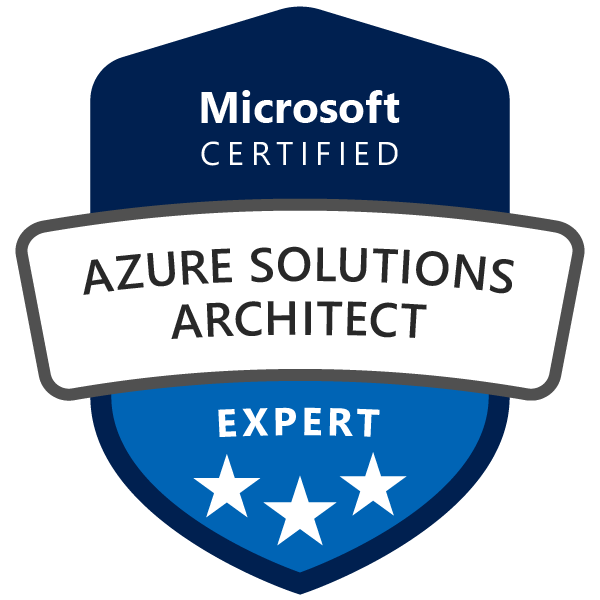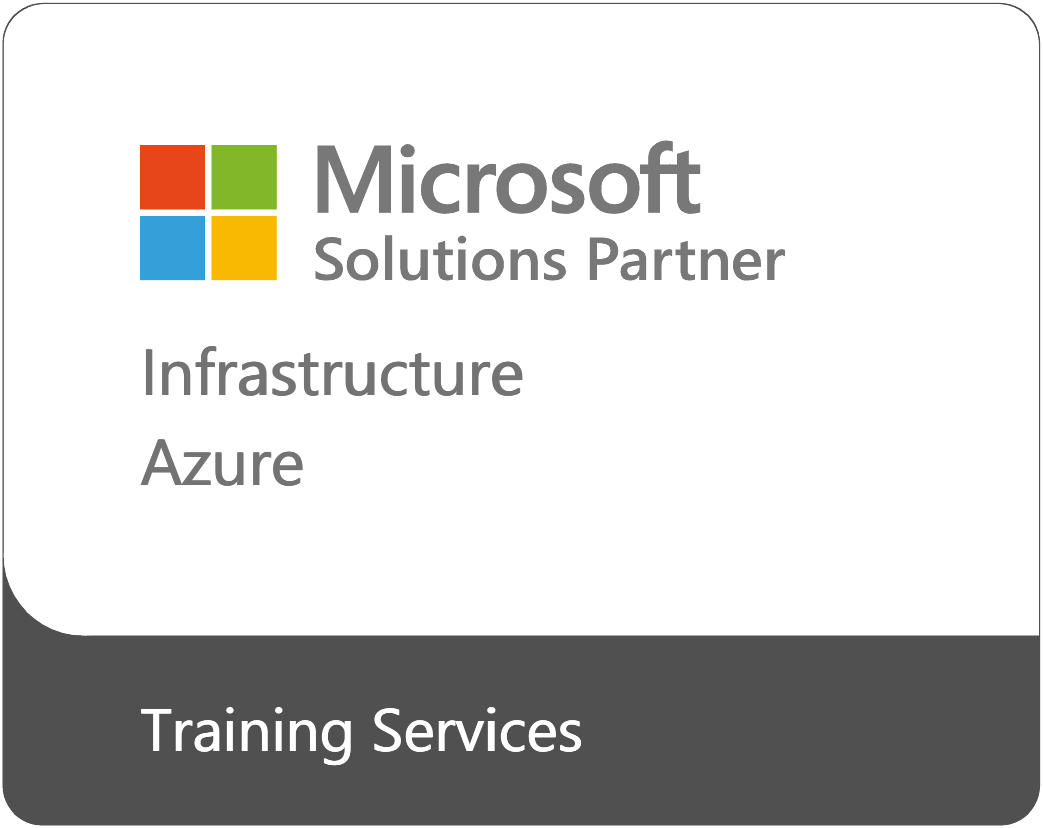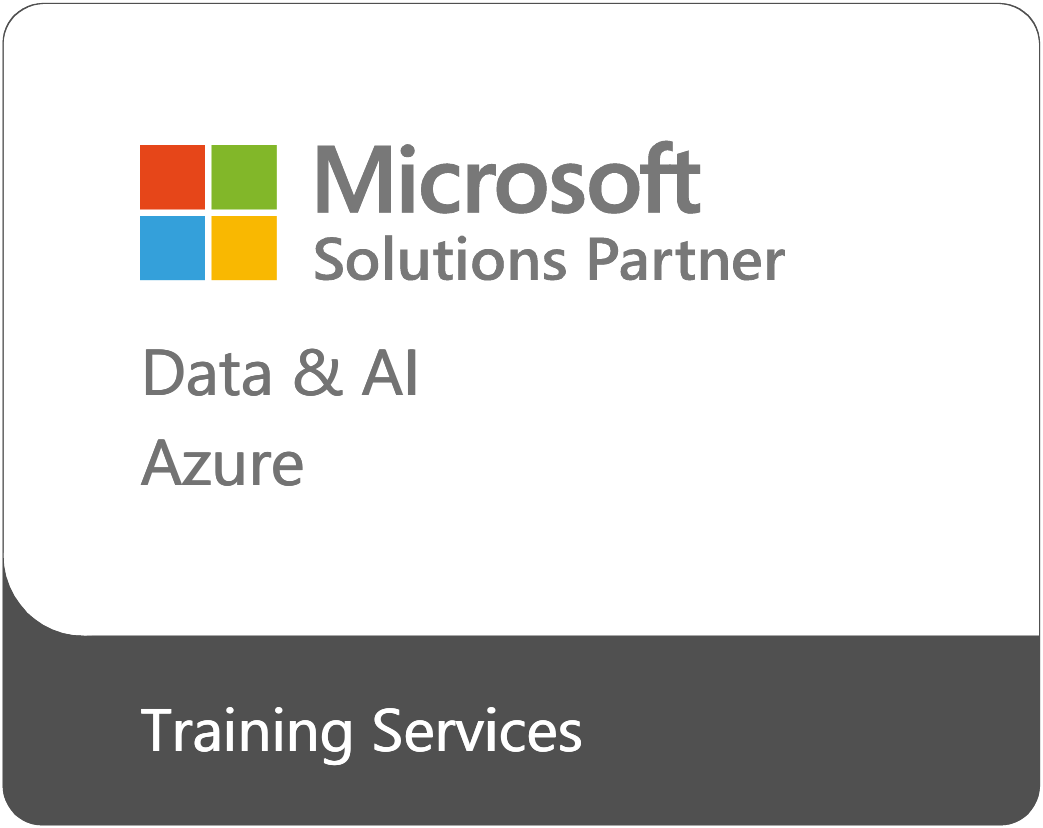Se alle priser, datoer og lokationsoplysninger
Oversigt



Hos Firebrand blev vi tildelt Microsoft Solutions Partner for Data & AI (Azure) og Infrastructure (Azure) badge som anerkendelse af vores ekspertise inden for levering af kvalitetsløsninger inden for dette specialiserede område.
På dette accelererede Microsoft Certified: Azure Solutions Architect Expert kursus vil du få de færdigheder, du har brug for som en Azure Solutions Architect til at implementere, overvåge og vedligeholde Azure solutions - lige fra implementering af virtuelle maskiner til at designe API-integrationsstrategier. Du vil også opnå ekspertforståelse af tjenestefunktioner inden for Microsoft Azure cloud.
På kun 7 dage vil du også lære at:
- Deploy and configure infrastructure
- Implement workloads and security
- Create and deploy apps
- Implement authentication and secure data
- Develop for the cloud and for Azure storage
- Determine workload requirements
- Design for identity and security
- Design a data platform solution
- Design a business continuity strategy
- Design for deployment, migration, and integration
- Design an infrastructure strategy
Du vil være nedsænket i curriculum og har 24/7 lab-adgang med Firebrands unikke Lecture | Lab | Review-metode som hjælper dig med at opbygge og fastholde information hurtigere.
Du vil få adgang til Microsoft Official Courseware (MOCs) og lære af certified Microsoft trainers MCTs) da Firebrand er en Microsoft Gold Partner for Learning.
Du vil også være forberedt på Exam AZ-104: Microsoft Azure Administratorand Exam AZ-305: Designing Microsoft Azure Infrastructure Solutions. Du vil tage disse prøverne i løbet af kurset, dækket af din Certificeringsgaranti.
Målgruppe:
Hvis du er en Azure Administrator, der administrerer skytjenester, der spænder over en række skyfunktioner, er dette kursus ideelt for dig.
Certificeringsvej:
Du har også muligheden for at tage prøverne separat. Når du har gennemført begge, opnår du automatisk Microsoft Certified: Solutions Architect Expert-certificeringen:
- Microsoft Azure Administrator Associate | Exam AZ-104
- Microsoft Designing Microsoft Azure Infrastructure Solutions | Exam AZ-305
Klassebaseret og online kursus i Microsoft’s Azure Solutions Architect Expert
Firebrand tilbyder både et klassebaseret og et online kursus i Microsoft Azure solutions architect expert, inklusive alt, hvad du har brug for for at blive certificeret:
- Officielt kursusmateriale, laboratorier og øveprøver
- AZ-104: Microsoft Azure Administratorand AZ-305: Designing Microsoft Azure Infrastructure Solutions certification exams
- Indkvartering, måltider og snacks (til beboelseskurser)
Undervisningsplan
Kursus AZ-104T00: Microsoft Azure Administrator
- Modul 1: Identity
- Modul 2: Governance and Compliance
- Modul 3: Azure Administration
- Modul 4: Virtual Networking
- Modul 5: Intersite Connectivity
- Modul 6: Network Traffic Management
- Modul 7: Azure Storage
- Modul 8: Azure Virtual Machines
- Modul 9: PaaS Compute Options
- Modul 10: Data Protection
- Modul 11: Monitoring
Kursus AZ-305T00: Designing Microsoft Azure Infrastructure Solutions
- Modul 1: Design governance and compute solutions
- Modul 2: Design storage and data integration solutions
- Modul 3: Design app architecture, access, and monitoring solutions
- Modul 4: Design network, continuity, and migration solutions
Certificering
Som en del af dit accelererede kursus vil du tage følgende eksamener på Firebrand Training -centeret, dækket af din Certificeringsgaranti:
Eksamen AZ-104: Microsoft Azure Administrator
- Kode: AZ-104
- Sprog: Engelsk
- Domæner:
- Håndtering af Azure-identiteter og governance (15-20%)
- Implementering og håndtering af lagring (15-20%)
- Udrulning og håndtering af Azure-computerressourcer (20-25%)
- Konfiguration og håndtering af virtuelle netværk (25-30%)
- Overvågning og backup af Azure-ressourcer (10-15%)
Eksamen AZ-305: Designing Microsoft Azure Infrastructure Solutions
- Kode: AZ-305
- Sprog: Engelsk
- Domæner:
- Design af identitets-, governance- og overvågningsløsninger (25-30%)
- Design af datalagringsløsninger (25-30%)
- Design af løsninger til forretningskontinuitet (10-15%)
- Design af infrastrukturløsninger (25-30%)
Inkluderet
Det hele er inkluderet! Du får en alt-inklusiv kursuspakke, som er målrettet til dine behov. Vi tager os af enhver detalje, så det eneste du skal fokusere på er dine lærings- og certificeringsmål.
- Transport til/fra specifikke afhentningssteder
- Overnatninger, samtlige måltider samt adgang til forfriskninger, snacks, kaffe og the.
- Intensiv Hands-on uddannelse med vores unikke (Lecture | Lab | Review)TM metode
- Omfattende kursusmaterialer og labmanualer
- Et helt igennem instruktørstyret program
- 24 timers adgang til både undervisningslokale og instruktøren
- Samtlige måltider samt adgang til forfriskninger, snacks, kaffe og the.
- Certificeringsgaranti
Forudsætninger
For at opnå Microsoft Certified Azure Solutions Architect Expert certification, skal du have opnået følgende certificeringer:
Hvad Er Inkluderet
Dit accelererede kursus inkluderer:
- Overnatninger *
- Måltider, ubegrænsede snacks, drikkevarer, te og kaffe *
- On-site eksamener **
- Eksamenskuponer **
- Øvelsestests **
- Certificeringsgaranti ***
- Kursusmaterialer
- Op til 12 timers instruktørledet undervisning hver dag
- 24-timers laboratorieadgang
- Digitale kursusmaterialer **
* Gælder kun for opholdskurser. Overnatninger er inkluderet fra natten før kursusstart. Dette gælder ikke for online kurser.
** Nogle undtagelser gælder. Se venligst eksamenssporet eller tal med vores eksperter.
*** Bestå første gang eller tag kurset om gratis så mange gange som nødvendigt, ubegrænset i 1 år. Betal kun for overnatninger, eksamener og eventuelle omkostninger.
Fordele
Syv grunde til at tage dit kursus hos Firebrand Training
- To træningsmuligheder. Vælg mellem opholdskurser eller onlinekurser.
- Du bliver certificeret hurtigt. Hos os bliver du trænet på rekordtid.
- Vores kursus er alt inklusive. Én fast pris dækker alle kursusmaterialer, eksamener**, overnatninger* og måltider*. Ingen skjulte omkostninger.
- Bestå første gang eller træn igen gratis. Dette er vores garanti. Vi er sikre på, at du består dit kursus første gang. Hvis ikke, kan du komme tilbage inden for et år og kun betale for overnatninger, eksamener og tilfældige omkostninger.
- Du vil lære mere. En dag hos en traditionel træningsudbyder varer normalt fra kl. 9 til 17, med en lang frokostpause. Med Firebrand Training får du mindst 12 timers kvalitetstid om dagen med din instruktør.
- Du vil lære hurtigere. Chancerne er, at du har en anden læringsstil end dem omkring dig. Vi kombinerer visuelle, auditive og taktile stilarter for at levere materialet på en måde, der sikrer, at du lærer hurtigere og lettere.
- Du vil studere med de bedste. Vi er blevet udnævnt til en af Training Industry's "Top 20 IT Training Companies of the Year" hvert år siden 2010. Ud over at vinde mange flere priser, har vi trænet og certificeret over 135.000 professionelle.
* Kun for opholdskurser. Gælder ikke for onlinekurser.
** Nogle undtagelser gælder. Se venligst eksamenssporet eller tal med vores eksperter.
 Sorry, no results!
Sorry, no results!
Which Study Mode is right for you?
City Centre
- Official vendor content aligned to certification
- Focused on getting every student ready for their exam
- Live instructor-led
- Extra hands-on labs & review sessions
- Exam preparation & practice tests
- Certification Guarantee
- Exam voucher included
- Attend nationwide
Online Live
- Official vendor content aligned to certification
- Focused on getting every student ready for their exam
- Live instructor-led
- Extra hands-on labs & review sessions
- Exam preparation & practice tests
- Certification Guarantee
- Exam voucher included
- Attend nationwide
- Extended training days
Residential
- Official vendor content aligned to certification
- Focused on getting every student ready for their exam
- Live instructor-led
- Extra hands-on labs & review sessions
- Exam preparation & practice tests
- Certification Guarantee
- Exam voucher included
- Extended training days
- 24-hour lab access
- Food & accommodation included
- Distraction-free
- On-site testing